Always practice French for real!
Today, I give you 9 suggestions to kill two birds with one stone!
First enjoy a beautiful stay in Montpellier and second turn it into a list of real challenges to progress in French.
☀️ Learn French in Montpellier
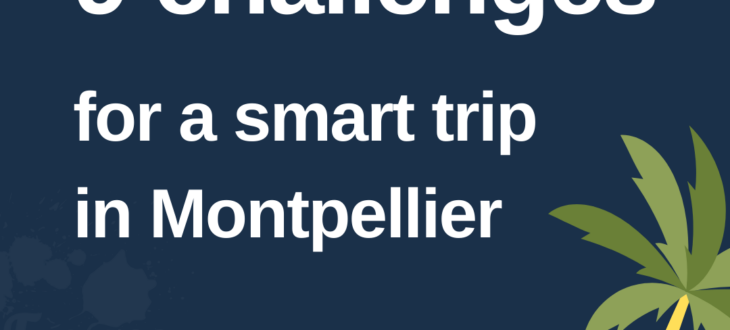
Today, I give you 9 suggestions to kill two birds with one stone!
First enjoy a beautiful stay in Montpellier and second turn it into a list of real challenges to progress in French.


You are currently living in Montpellier for work or to study or you will visit soon and maybe wondering about DELF exam and how you can get prepared for it?
First, why would you even do that 😅?
You need to know that the DELF B2 exam is a French official certificate valid for lifetime. It is required to prove your proficiency if your project is for example to go to a French university / business school or apply for citizenship.
It is divided into 4 parts, 3 at the same time with other people (listening, reading and writing) and the last part (speaking) in a one-to-one assessment.
Listening
Forget everything, close your eye if needed and focus on what you hear, don’t interpret, just l-i-s-t-e-n.
Don’t tell yourself “I understand nothing”, grab these words and pieces of sentences you caught.
You can practice listening with short videos from local TV channel France 3 Occitanie and when you will feel confident, short audio reports like this one from France 3 Hérault and then, step by step, you go to longer contents, etc. Find what works for you.
Reading and writing
Always focus on finding the verb in a sentence! It will lead you to the sujet and the most important elements to understand the meaning. To practice French reading, focus on what you like, for example if you like tennis 🎾, follow French sport news and French athletes on social media to become more and more familiar with the vocabulary. Also, you will find here my advice if you want to read books in French 📚.
This being said, as you can easily guess, if you read regularly in French, you will naturally be prepared for the writing part of the exam. Indeed, while you read, your brain does its work silently: remembering expressions but also things that go together and things that don’t (always follow that voice inside you!).
Speaking
Managing time is particularly important here so prepare a bullet list of what you want to say because you don’t have the time to write a full text. Also, the purpose of this exercise is to prove your speaking level, not convincing or being convinced, so even if you don’t ride a bike, don’t put an end to the exercise because you are not concerned by this topic ! Always try to find a way to develop ideas, for example in this case, you could talk about a close one who is concerned.
Remember that the aim of the exercise is to make the instructor forget about the exam because both of you are having a smooth conversation in French 🤩!
📍 Examples of mistakes you can’t afford to make with a B2 level in French: forgetting the connection between “de + un” making “d’un” or not knowing the conjugation of basic verbs like être, avoir, aller.
🔥 Last but not least, your mindset is the key before and during the exam!
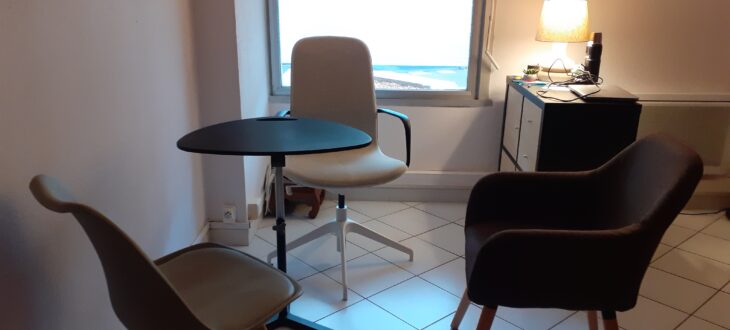
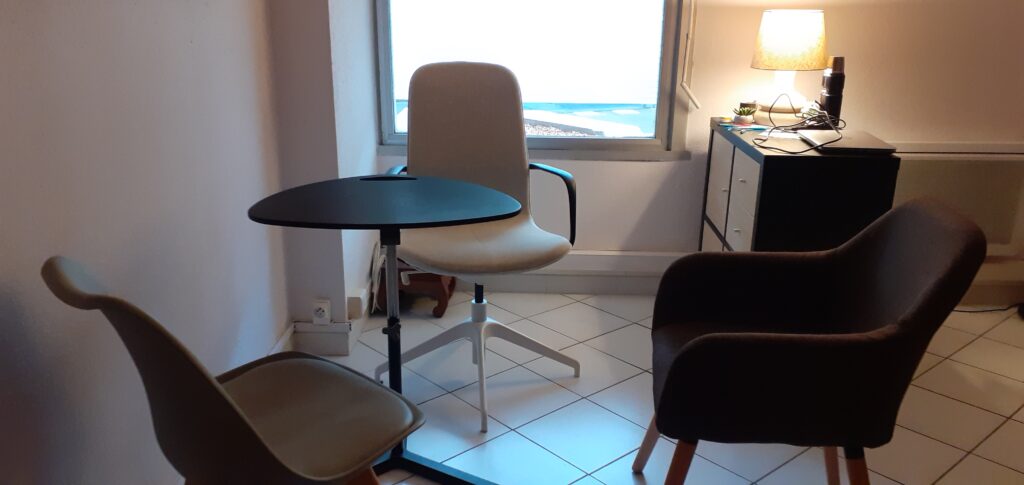
Pam & Tom (USA) ont eu la primeur (expression: “avoir la primeur” / meaning)! 😃
They are my first clients in Montpellier since I moved from Dijon and the first ones to discover my new office! It’s close to tram station Albert 1er – Cathédrale so very convenient for our weekly Start French Now sessions.
⚠️ I share this office with other self-employed people so make sure to contact me beforehand: my availability for appointments is only on Tuesdays for now.
How about you take this opportunity to schedule a free French session in Montpellier?
I can’t wait to know more about your goals regarding French language and of course practice!
📍 24 avenue Bouisson Bertrand 34090 MONTPELLIER – Sur RDV le mardi / By appointments on Tuesdays

French parliament has just approved a toughened immigration law which, if it is confirmed by enactment, will have an impact on non EU-students.
To apply for a student residence permit, a deposit will be required and students will be expected to put it on a frozen account.
𝗪𝗵𝗼 𝗱𝗲𝗰𝗶𝗱𝗲𝘀 𝘁𝗵𝗲 𝗮𝗺𝗼𝘂𝗻𝘁?
It is said that the amount will be decided by a decree. FYI, in France, a decree can be issued either by the Prime Minister or the President.
Reports talk about:
🤷 €10 or €20, said Prime Minister Borne
🤷 several thousands euros
🤷 €10,000 was also heard at the Assemblée nationale
📚 It is a shame to prevent ambitious students from coming in France to study the language and the culture but not that surprising considering the fact that our country is more and more losing its voice when it comes to world matters.
Our school stands with the individuals and organizations opposed to this law: students unions, universities, lawyers, but also human rights organizations such as Amnesty International France or Utopia 56 especially concerned by the situation of refugees in France, which is worsening year by year.
École Bonjour France will keep doing its job: make people love French language and help them find their way and their due place in a French-speaking environment.

It is not easy to get familiar with French grammar not to mention the vocabulary especially when you have to respect when it is masculine and when it is feminine!
Our school offers French courses to anyone interested to discover French language and culture. If you live in Montpellier, we can schedule one-to-one sessions or group sessions. If you don’t live in Montpellier, it is possible to take online sessions.
Anyway, feel free to contact us or even to book a free French talk with Samyra if you have any question before joining!
Indeed École Bonjour France is a small and friendly French school with easy access to Samyra, the founder and instructor.
No complicated steps nor hidden fees to join!
We are perfectly aware of your struggles with the French administration not to mention the fact that the average French doesn’t speak a second language fluently so be sure that you are certainly a role model for a lot of people here as far as the languages are concerned…

Since 2019, our small school has trained almost 30 Researchers from INRAE Bourgogne Franche-Comté!
𝗪𝗲 𝗮𝗿𝗲 𝗻𝗼𝘄 𝘄𝗲𝗹𝗹 𝗮𝘄𝗮𝗿𝗲 𝗼𝗳 𝘁𝗵𝗲𝗶𝗿 𝗶𝘀𝘀𝘂𝗲𝘀 𝘄𝗵𝗲𝗻 𝗶𝘁 𝗰𝗼𝗺𝗲𝘀 𝘁𝗼 𝗹𝗲𝗮𝗿𝗻 𝗙𝗿𝗲𝗻𝗰𝗵:
❌ first of all, it’s hard to find your place in a new country, culture, language, etc.
❌ especially when you have to perform asap at work in English but in a French-speaking environment
❌ when you don’t have time to learn and go out to practice IRL
❌ when the French contents provided don’t fit or are far from your interests
❌ when you don’t feel well-regarded for example if you feel pressure to learn French but don’t get help from your colleagues (by the way, we could talk about those who can’t even speak English 👀)
etc.
🔥 𝙃𝙤𝙬 𝙖𝙗𝙤𝙪𝙩 𝙬𝙚 𝙤𝙫𝙚𝙧𝙘𝙤𝙢𝙚 𝙬𝙝𝙖𝙩 𝙘𝙖𝙣’𝙩 𝙗𝙚 𝙘𝙝𝙖𝙣𝙜𝙚𝙙 𝙖𝙣𝙙 𝙝𝙖𝙫𝙚 𝙖𝙣 𝙞𝙢𝙥𝙖𝙘𝙩? 🔥

Take a look at one of the biggest achievements of our school in 2022!
INRAE Dijon told us about three researchers, Yaoyun (China), Denise (Brasil) and Didac (Spain), very advanced in French and determined to progress even more. ✊
Since they work on legumes, we wanted to make them think about how to use French in order to be understood on the radio and at the same time, how to popularize your work as a researcher.
🔥 This issue gave us all an opportunity and a challenge during several months:
✅ create a unique and specific French course aiming at recording a real podcast
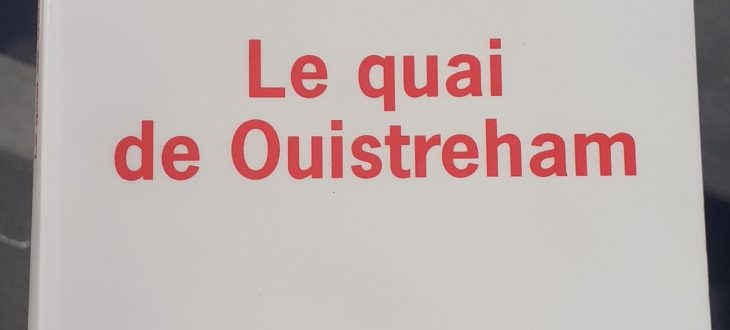
Saturday 16th July
This morning was our weekly class with Eugene, Julia and Nina.
Before we parted, we talked about the situation in their country, Ukraine and how hard it is for them to adapt here and learn French in Dijon. Their level is really advanced but they feel like it is not enough to live and work in France.
“Don’t say it if your project is to go back“. That’s what I advised them to tell when in a job interview.
I can see the sadness in their eyes and their smiles. Their heart is with the missing ones. They remind me of the Syrian people I met back in the beginning of the war in their country. Heartbroken to see that the whole world would keep turning like nothing changed.
While wars still go on.
Home, career, future: it is not by choice that you leave everything behind you. And at least when you do have an everything behind you. What about all those, I told them, who have nothing left but hope when they go through seas, deserts and unfriendly places, looking for a better life?
It breaks your heart when you realize that some people have a destiny you may never be at risk and even able to face yourself.
Now waiting for the bus, another day of strike in France, I turn the last pages of French journalist Florence Aubenas’ book, Le Quai de Ouistreham. Her undercover investigation about the precarity of cleaning jobs is of public interest. More than 10 years after this book was published, the yellow jackets protests started in France.
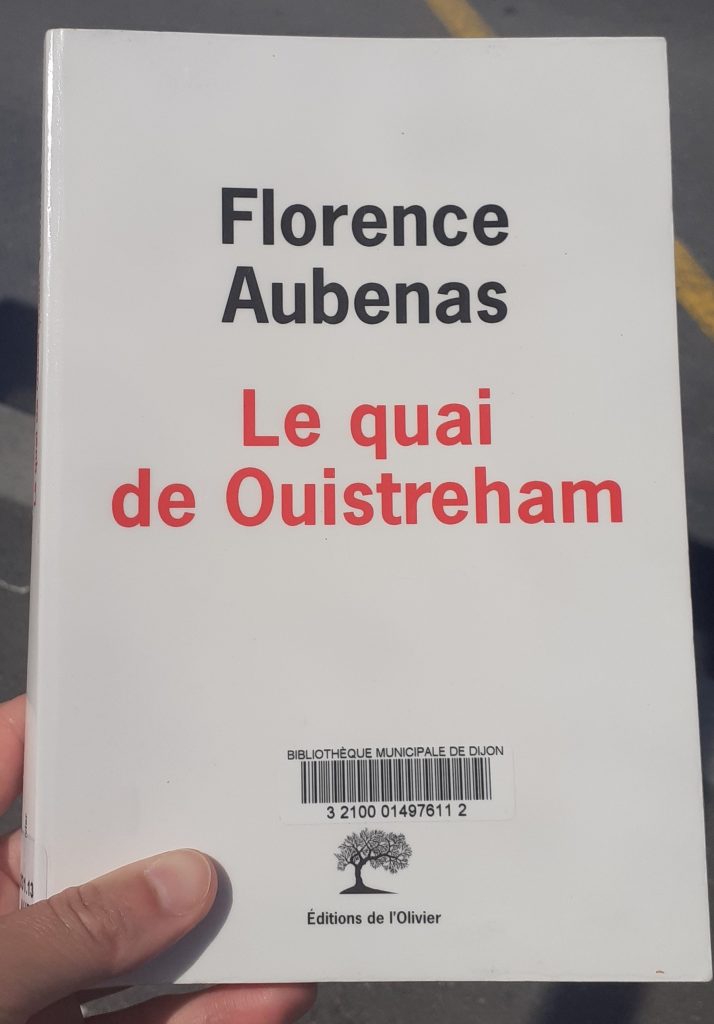
It breaks your self-esteem when you are stuck and silenced in a meaningless life.
The bus has eventually made it. This is another summer day safe in France. The sun is bright and the sky is blue. Everything seems under control except that we face another heat wave.
No one knows if this is the calm before the storm.
No one knows what people go through.
Let us just stick together to what we c-a-n do.
Lifelong learning and adapting.
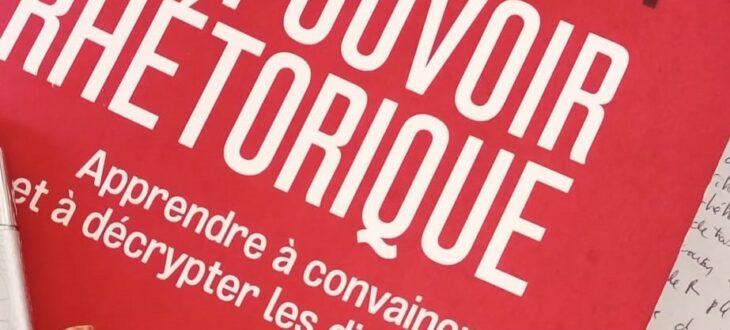
Clément Viktorovitch is a famous French Rhetoric teacher at Science-Po Paris. For several years now, he has been going on radio and TV to decrypt public figures’ speeches. His contributions to encourage people, especially young generations, to understand how language works and how important it is in a democracy is amazing!
As soon as he released his book in October 2021, I wanted to read it and here is one sentence to sump it up:
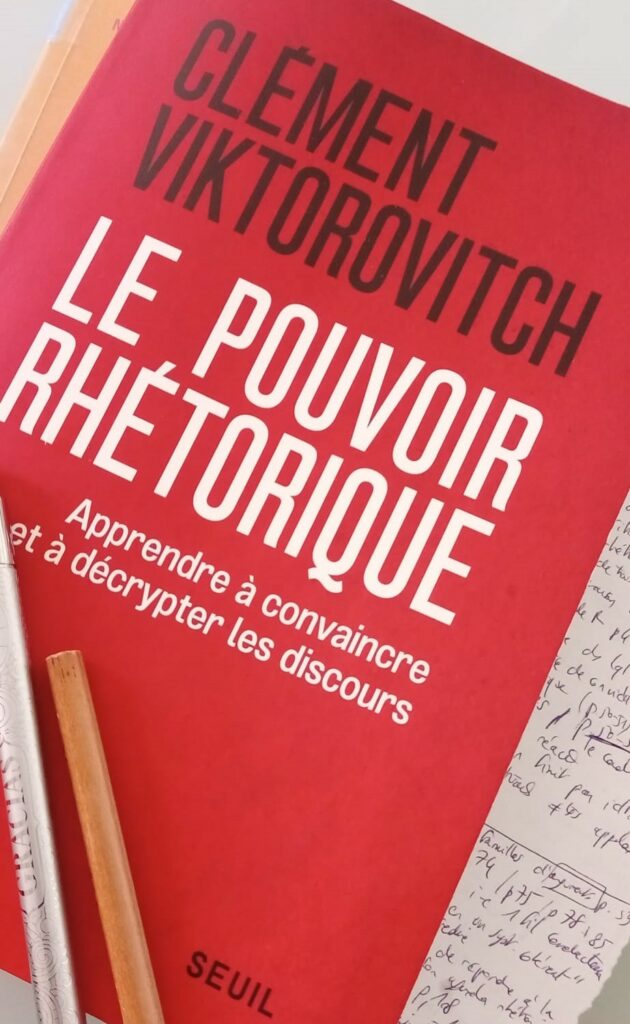
Rhetoric is a power that will empower you, go grab it!
La rhétorique est un pouvoir qui donne du pouvoir tout court alors vous aussi, prenez ce pouvoir !
Viktorovitch’s book is a must-read book for anyone who lives in a French-speaking environment so both French natives like me and French advanced learners should definitely read it!
Knowing the high-quality of Viktorovitch’s content, I really wanted to have an active reading. During all the process, I took notes for myself but also to share here hoping this content can help raise awareness about the importance of langage.
First, you will find below the beginning of the retranscription of my audio, then my interpretation of rhetoric’s ID from the book and finally, 9 tips to become powerful thanks to rhetoric. 😎
Le Pouvoir rhétorique de Clément Viktorovitch est paru en automne 2021. Ce livre donne les savoirs de base sur la rhétorique mais aussi bien sûr plein d’exemples concrets. L’auteur, on ne le présente plus : enseignant à Science Po, chercheur, il est surtout connu pour ses interventions dans les médias. En décryptant les paroles publiques, il veut rendre accessibles à tous les clefs du langage car si nous sommes en démocratie, dit-il, c’est notre droit. Autrement dit : “la rhétorique est un pouvoir qui donne du pouvoir tout court alors vous aussi, prenez ce pouvoir !”.
Il explique que la rhétorique est fondamentalement liée à la démocratie. Pour que le citoyen puisse faire un choix entre plusieurs candidats, il faut qu’il s’appuie sur leurs discours (p14) et qu’il soit aussi à même de s’exprimer à son tour pour prendre part à cette vie démocratique. Pour poursuivre et protéger cet idéal, il ne peut donc y avoir d’autre solution que la transmission de la rhétorique. C’est d’autant plus vrai, ajoute-t-il, que certains citoyens l'utiliseront pour manipuler tandis que d’autres seront manipulés. Et nous sommes tous libres de nous poser la question : “quel orateur voulons-nous être ?” (p23). À travers ce livre, Viktorovitch veut nous proposer une “rhétorique pratique” (p36) qui va nous accompagner et nous entraîner au quotidien. Il utilise une métaphore intéressante : pour lui, la rhétorique se situe entre le karaté et l’aïkido.
« si la rhétorique était un art martial, elle serait à la fois le karaté et l’aïkido » (p44)
périmètre tridimensionnel de la rhétorique : « argumenter, plaire, émouvoir » (p46) - (argumenter = logos ; plaire = ethos ; émouvoir = pathos)
« plus nous paraissons convaincus et plus nous avons tendance à en devenir convaincants » (p84)
« plus un procédé est visible et moins il est efficace » (p403)
« plus notre argumentation sera ramassée, resserrée, condensée et plus elle en sera percutante, incisive, mémorable » (p123)
* il y en a 4 principales : monologique, délibérative, compétitive, conflictuelle** (p50) **celle-ci est absurde du point de vue de la rhétorique car c'est celle des débats stériles et des invectives (p53), mieux vaut s’en détourner, conseille l'auteur
Exemple : si on vous dit qu’« intello » est associé à quelque chose de barbant ou compliqué, vous pouvez contredire en affirmant qu’il est associé au contraire à quelque chose d’exigeant et profond !
L’auteur conseille d’utiliser des formulations positives, particulièrement pour se décrire soi-même, et plus généralement de n’employer que des mots dont les connotations sont à notre avantage (p179) « Les mots que nous proférons déterminent notre perception du monde. Il ne tient qu’à nous de la réenchanter. Voilà un bon exemple de ce que la rhétorique peut, au quotidien, nous apporter » (p182)
*conseil de l’auteur : « devenir des décrypteurs du discours » (p198). En effet, les indices sont partout autour de nous, à nous d’apprendre à les identifier. Par exemple, même le choix de la conjugaison est de la rhétorique : on utilise le « je » pour se mettre en avant ou susciter de l’empathie mais si cela ne nous arrange pas de porter la responsabilité de quelque chose, on va s’abriter derrière le « on » ou le « nous » (p191)
« L’une ne va pas sans les autres » (p233) ; utiliser la rhétorique des émotions est une bonne idée quand c’est bien pensé, adapté à la situation, justement dosé et si cela incite à l’action (cf. fin du chapitre 5)
« D’un point de vue de la rhétorique, ces caractéristiques confèrent à la surprise une utilité tout à fait unique. Parce qu’elle va saisir les auditeurs et faciliter leur attention, elle permet de mettre en valeur l’émotion qui lui succède et de décupler son efficacité. » (p283)
« Retenons-le, c’est dans les silences les plus lourds que surgissent, flamboyants, les grands discours » (p285) ; « Le premier outil, pour s’assurer d’être écoutés… c’est le silence » (p410) cf. le contexte du débat contradictoire, « combat pour la parole », il ne peut être remporté que grâce au silence !
L'ethos est l'image que nous renvoyons en tant qu'assise de notre force de conviction. Viktorovitch en parle comme de « l’œuvre d’une vie » à forger (p341), c’est dire son importance ! *il consiste en 3 enjeux : paraître sincère, compétent et séduisant (p311)


A few months ago, I met someone who was living in France for 10 years and since he didn’t need French for work – he worked in the wine business industry -, he didn’t practice it and / or didn’t find it necessary to learn it.
A few days ago, the same situation happened: a man called and said that his wife, who moved in a few years ago now, just found it necessary to take French lessons because she faces difficulties to get a job. He wanted to know how I could help.
😱OK.
I decided that I am not the right teacher for this profile of learner. Do you know why?
I don’t know how to deal with them. Sincerely.

Because the first question one needs to ask himself as soon as he arrives in a new country and by the way, as soon as he decides to move in another country* HAS to be:
*of course, I am not talking about a situation of emergency when people are forced to leave their home and migrate (they have all my respect 🙏)
What is MY personal strategy to learn the language?
A language is a key that will allow you to open the door of a new country / city / community and BECOME A PART OF IT.
Without the language, you stay at the door.
Period.
So for your own good, please take a moment and write down things you like and hobbies you have, anything you want as long as they can fit the four skills and then keep doing them but in French:
listening / talking
reading / writing
Do you like sports? Follow instagram accounts of famous local sport teams (in France: football, cycling, etc.).
Do you like make-up vloggers? Look for French Youtubers
Can you sew? Join a sewing group, etc.
Also, the very first thing you need to do as soon as you arrive in France is to go get a library card! 😍Most of the time, it’s cheap or even FREE.
I am a huuuge fan and most of the books I read come from public libraries!
You will be able to borrow plenty of books, DVDs, etc. in French, know more about local events, meet new people, have more confidence and one day, without even realizing it: you will be fluent! Of course, it’s a process: even natives make grammar mistakes, etc. it’s normal.
To me, being fluent in French is not about knowing the language perfectly (who can do that?), it’s more about feeling comfortable because YOU BELONG HERE.
Do you know what I answered to the man asking for help on behalf of his wife?
I asked if they have children (yes) and why she didn’t call me herself (she speaks French a little but didn’t feel confident).
I said that I could obviously make them pay for French lessons but it would be wrong because it’s not the problem here.
I gave him the advice above and added that if you start a life in France, you are physically here but you need to ask yourself if you are MENTALLY here.
When you help your children with their homework in French, when you go to the library or attend local events as a family or when you challenge yourself with actions such as calling someone you don’t know to ask for information, it makes you BE IN CHARGE.
So you feel more and more confident.
💪 And you don’t have time to look back because you are too busy looking forward and widening your comfort zone.